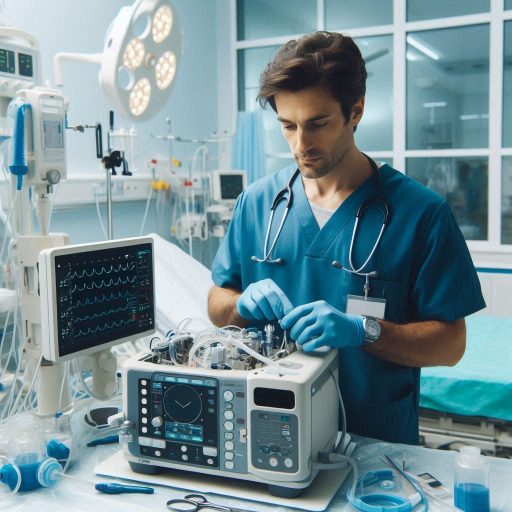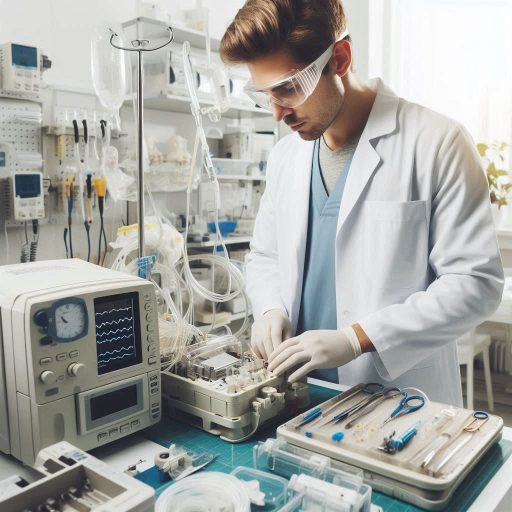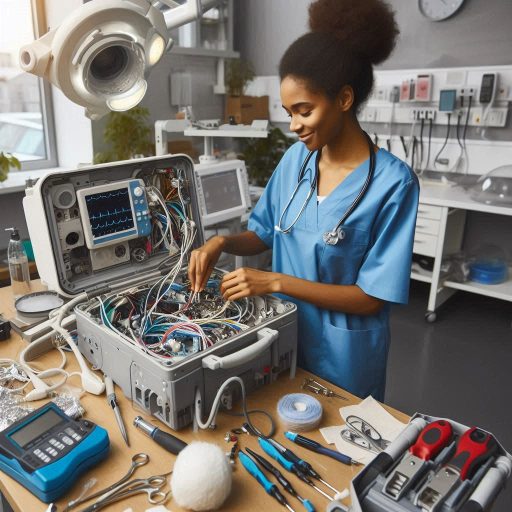Introduction
Internship Opportunities for Biomedical Technician Students
Internship opportunities are a fundamental aspect of education for biomedical technician students.
These positions offer practical, hands-on experience in real-world settings, allowing students to apply theoretical knowledge acquired in their studies.
Internships provide a unique platform for students to work alongside professionals, gain insight into daily operations, and understand the intricacies of the biomedical technology field.
They are an essential step in bridging the gap between classroom learning and actual job performance, setting the stage for a successful career.
The Importance of Gaining Practical Experience in the Field of Biomedical Technology
Practical experience is crucial for anyone pursuing a career in biomedical technology.
This field requires not only theoretical understanding but also the ability to handle sophisticated equipment and respond to real-time challenges.
Internships allow students to familiarize themselves with industry-standard tools and procedures, ensuring they are equipped to meet the demands of the profession.
By immersing themselves in practical scenarios, students develop a deeper understanding of the technical and operational aspects of the field, enhancing their problem-solving skills and increasing their overall job readiness.
How Internships Can Benefit Students in Terms of Skill Development and Networking Opportunities
Internships offer numerous benefits beyond skill development.
They provide students with the chance to refine their technical abilities, learn from experienced professionals, and gain exposure to cutting-edge technologies and methodologies.
This hands-on experience is invaluable for developing a strong skill set and understanding industry best practices.
Additionally, internships facilitate networking opportunities, allowing students to connect with industry experts and potential future employers.
Building these professional relationships can open doors to job opportunities, mentorship, and career advancement.
Overall, internships are a critical component of professional growth, providing the tools and connections needed for a successful career in biomedical technology.
Overview of Biomedical Technician Internship Programs
The Types of Organizations that Offer Internship Programs for Biomedical Technician Students
Biomedical technician internships are available through various organizations.
Hospitals are among the most common venues, providing practical experience with medical equipment and patient care.
Medical device companies also offer internships, focusing on technology development and equipment maintenance.
Research laboratories provide opportunities to support innovation in biomedical technologies.
Each organization offers unique learning experiences and professional growth.
The Duration of Internships and the Typical Responsibilities Assigned to Interns
Internships for biomedical technicians typically last between 10 to 12 weeks.
Some programs may extend up to six months, depending on the organization’s requirements.
Interns usually work full-time during this period.
Responsibilities often include performing routine equipment checks, assisting with repairs, and supporting senior technicians with complex tasks.
Interns may also be involved in calibrating devices and troubleshooting issues, which helps build technical skills and gain hands-on experience.
Examples of Well-Known Companies or Hospitals that Frequently Offer Internship Opportunities in This Field
Several well-known organizations frequently offer internship opportunities for biomedical technicians.
Hospitals like Mayo Clinic and Cleveland Clinic are renowned for their comprehensive internship programs.
These programs provide interns with valuable experience in maintaining and repairing medical equipment.
Medical device companies such as Medtronic and Johnson & Johnson also offer internships.
These companies provide insight into the development and testing of new technologies.
Additionally, research institutions like the National Institutes of Health (NIH) offer internships that focus on innovative research and equipment analysis.
In summary, biomedical technician internships are offered by a diverse range of organizations, each providing different experiences and responsibilities.
These internships typically last from 10 to 12 weeks and involve hands-on work with medical equipment and technology.
By participating in programs offered by well-known hospitals and companies, students gain valuable skills and build a strong foundation for their careers.
Read: Impact of Drones on Surveying and Mapping
Benefits of Interning as a Biomedical Technician Student
How Internships Can Help Students Apply Theoretical Knowledge to Real-World Situations
Internships allow biomedical technician students to bridge the gap between classroom learning and practical application.
Students use their theoretical knowledge to tackle real-world problems, such as diagnosing equipment issues and performing repairs.
This hands-on experience reinforces their understanding of technical concepts and procedures.
By working with actual medical devices and systems, interns see how theory translates into practice, enhancing their problem-solving skills and technical proficiency.
The Potential for Internships to Lead to Full-Time Job Offers Upon Graduation
Internships often serve as a stepping stone to full-time employment.
Many organizations use internships to evaluate potential employees in a real-world setting.
Successful interns may receive job offers from the same organization where they completed their internship.
Companies value interns who already understand their operations and culture.
Internships provide a chance for students to prove their skills and work ethic, making them strong candidates for future job openings.
How Internships Can Help Students Build a Professional Network Within the Industry
Internships are an excellent opportunity for students to build a professional network.
Working closely with experienced biomedical technicians and industry professionals allows interns to form valuable connections.
These relationships can lead to mentorship opportunities, professional advice, and job referrals.
Networking with professionals in the field also provides insights into industry trends and career opportunities.
A strong network can be instrumental in finding job opportunities and advancing one’s career after graduation.
In summary, interning as a biomedical technician student offers numerous benefits.
Internships help students apply theoretical knowledge to real-world situations, leading to a deeper understanding of their field.
They also provide a pathway to full-time employment and help build a professional network, which is crucial for career development.
Read: Surveying and Mapping Technician Internships: A Guide
Tips for Landing a Biomedical Technician Internship
How Students Can Search for and Secure Internship Opportunities in This Field
Finding a biomedical technician internship starts with thorough research.
Begin by exploring opportunities through your school’s career services and internship programs.
Many universities have partnerships with hospitals, research labs, and medical device companies.
Additionally, check job boards and company websites for internship listings.
Platforms like LinkedIn and Indeed often feature internship opportunities.
Apply to multiple positions to increase your chances, and tailor your applications to each specific role.
The Importance of Networking and Attending Career Fairs to Connect with Potential Internship Providers
Networking is crucial for securing an internship in the biomedical field.
Attend career fairs and industry events where you can meet potential employers and learn about internship openings.
Engage with professionals and ask insightful questions about their work and internship programs.
Networking not only provides valuable contacts but also gives you a chance to make a memorable impression.
Building relationships with industry professionals can lead to valuable referrals and insider information about available positions.
Tips on Crafting a Strong Resume and Cover Letter Tailored to Biomedical Technician Internships
A strong resume and cover letter are essential for landing an internship.
Highlight relevant coursework, projects, and any hands-on experience with medical equipment or technology.
Emphasize skills such as troubleshooting, maintenance, and technical proficiency.
Use specific examples to demonstrate your abilities and achievements.
Your cover letter should reflect your enthusiasm for the field and explain why you are interested in that particular organization.
Tailor both documents to the internship position, showcasing how your skills align with the job requirements.
In summary, to land a biomedical technician internship, start with diligent research and apply broadly.
Networking and attending career fairs can provide valuable connections and job leads.
Craft a compelling resume and cover letter tailored to the position to stand out from other candidates.
By following these tips, you can enhance your chances of securing a valuable internship opportunity in this field.
Read: How to Become a CAD Technician: Step-by-Step Guide

Testimonials from Former Biomedical Technician Interns
Quotes and Stories from Students Who Have Previously Completed Internships in Biomedical Technology
- Jane Doe, Biomedical Technician Intern at Mayo Clinic: My internship at Mayo Clinic was an eye-opener.
I worked directly with advanced medical equipment and learned how to handle real-world technical issues.
The experience was invaluable, and I gained hands-on skills that I couldn’t have learned in the classroom. - John Smith, Biomedical Technician Intern at Medtronic: At Medtronic, I was involved in testing and improving new medical devices.
The projects were challenging, but they helped me apply what I had learned in my coursework. The support from my mentors and the team was incredible.
Allow Former Interns To Share Their Experiences, Challenges, and Successes During Their Internship
- Emily Chen, Former Intern at Cleveland Clinic: My internship was both rewarding and demanding.
I faced challenges like troubleshooting complex equipment failures, but each problem solved increased my confidence and technical abilities.
I felt proud when I successfully completed a critical maintenance task that directly impacted patient care. - Michael Lee, Former Intern at NIH: Working at NIH provided a unique opportunity to be involved in groundbreaking research.
The challenge of calibrating sophisticated instruments and analyzing experimental data was intense.
However, overcoming these challenges taught me resilience and attention to detail, which have been essential in my career.
How Internships Have Positively Impacted Their Career Paths and Helped Them Grow Professionally
- Sarah Patel, Biomedical Technician Intern at Boston Medical Center: My internship was a turning point in my career.
It not only enhanced my technical skills but also allowed me to network with industry professionals.
I received a full-time job offer from Boston Medical Center after graduation, thanks to the connections I made during my internship. - David Johnson, Biomedical Technician Intern at GE Healthcare: Interning at GE Healthcare was instrumental in shaping my career.
I learned about the latest technologies and industry standards.
The experience gave me a competitive edge and helped me secure a position with a leading medical device company right after graduation.
In summary, testimonials from former biomedical technician interns highlight the transformative impact of their experiences.
These internships provided practical skills, professional growth, and valuable networking opportunities.
Challenges faced during the internships were met with resilience, leading to significant career advancements and personal development.
Read: Top CAD Software for Aspiring CAD Technicians
Industry Trends in Biomedical Technology Internships
Current Trends in the Field of Biomedical Technology That May Impact Internship Opportunities for Students
The field of biomedical technology is evolving rapidly, impacting internship opportunities for students.
One major trend is the increasing integration of artificial intelligence (AI) and machine learning into biomedical devices.
These technologies enhance diagnostics, patient monitoring, and personalized medicine.
Interns with skills in AI or data analysis may find new opportunities in companies developing smart medical devices.
Additionally, the emphasis on telemedicine and remote monitoring solutions is growing, creating demand for interns who can work on these technologies.
Another trend is the focus on cybersecurity within biomedical technology.
As medical devices become more connected, ensuring their security is crucial.
Internships in this area are likely to involve learning about cybersecurity measures and how to protect sensitive medical data from breaches.
Emerging Technologies or Areas of Specialization That Are in High Demand for Internships
Emerging technologies are creating new areas of specialization in biomedical technology.
One notable area is the development of wearable health technology, such as fitness trackers and smartwatches with advanced health monitoring capabilities.
Interns working in this sector may engage in design, testing, and data analysis related to these devices.
Another high-demand area is regenerative medicine, which includes the use of stem cells and tissue engineering to repair or replace damaged tissues and organs.
Interns in this field may work on cutting-edge research or assist in the development of new therapies.
Robotic surgery is also a growing specialization.
The integration of robotics in surgical procedures requires sophisticated technology and precise calibration.
Interns may have opportunities to work with robotic systems and learn about their operation and maintenance.
Any Changes or Advancements in Internship Programs Within the Biomedical Technology Industry
Internship programs in biomedical technology are becoming more structured and specialized.
Many organizations now offer targeted training modules that align with current industry needs.
Programs are increasingly incorporating project-based learning, where interns work on specific, real-world projects relevant to their field.
Additionally, virtual internships are becoming more common, allowing students to gain experience remotely.
This format expands opportunities for students who may not have access to local internship positions.
Virtual internships often include digital collaboration tools and remote mentoring, providing flexibility and a broader range of experiences.
Moreover, some companies are enhancing their internship programs with mentorship and career development resources.
Interns may now have access to workshops, networking events, and career coaching as part of their program.
These additions help interns build their professional skills and prepare for future career opportunities.
In summary, industry trends in biomedical technology are shaping internship opportunities with a focus on AI, cybersecurity, and emerging technologies.
Specializations like wearable health tech, regenerative medicine, and robotic surgery are in high demand.
Advances in internship programs include more structured, project-based learning and the rise of virtual internships, offering students diverse and flexible experiences.
Transform Your Career Today
Unlock a personalized career strategy that drives real results. Get tailored advice and a roadmap designed just for you.
Start NowResources for Finding Biomedical Technician Internship Opportunities
Online Resources, Job Boards, and Career Websites Where Students Can Search For Internship Openings
- LinkedIn: LinkedIn’s job search feature allows students to find biomedical technician internships by filtering for industry, location, and company.
Additionally, joining relevant groups and following companies can provide updates on internship openings. - Indeed: Indeed aggregates internship listings from various sources.
Students can use specific keywords like “biomedical technician intern” to find relevant opportunities and set up job alerts to receive notifications. - Glassdoor: Glassdoor offers job listings along with company reviews.
Students can search for biomedical technician internships and read about the experiences of past interns to gain insights into potential employers. - SimplyHired: SimplyHired provides a broad range of internship listings.
Students can use filters to narrow down opportunities in biomedical technology based on location and company. - ZipRecruiter: ZipRecruiter lists internships and allows students to apply directly through the platform.
The site also offers resources for resume building and interview preparation. - CareerBuilder: CareerBuilder features a variety of internships in biomedical technology.
Students can set up personalized job alerts and access career advice articles.
Professional Organizations or Associations Offering Internship Listings or Support
- Biomedical Engineering Society (BMES): BMES offers a career center with job and internship listings specifically for biomedical engineering and technology students.
Membership provides access to industry-specific opportunities and networking events. - American Society for Biomedical Engineering (ASBE): ASBE provides resources for students, including internship listings and career development tools.
Membership often includes access to exclusive job boards and industry news. - National Society of Professional Engineers (NSPE): NSPE offers internship listings and career resources.
While not specific to biomedical technology, it provides support for students pursuing engineering internships. - Association for the Advancement of Medical Instrumentation (AAMI): AAMI’s career center features job and internship listings related to medical instrumentation and technology.
It also offers resources for professional development and certification.
Encouraging Students to Reach Out to Career Services at Their Educational Institution
Students should actively engage with their educational institution’s career services.
These offices often have partnerships with local businesses and organizations offering internships.
Career services can provide personalized guidance, including resume reviews, interview preparation, and job search strategies.
Additionally, they may host career fairs and networking events where students can connect with potential employers directly.
Utilizing these resources can significantly enhance a student’s chances of securing a valuable internship.
In summary, students can find biomedical technician internships through various online job boards, career websites, and professional organizations.
Leveraging these resources, along with actively engaging with career services at their educational institution, will help students uncover valuable internship opportunities and receive support throughout their job search process.
Conclusion
The Key Points Discussed in the Blog Post About Internship Opportunities for Biomedical Technician Students
Internships provide essential hands-on experience for biomedical technician students.
They offer exposure to real-world technologies and practices, significantly enhancing technical skills and understanding of industry standards.
Internships also facilitate valuable networking opportunities within the field.
The Importance of Gaining Practical Experience Through Internships in Order to Enhance Career Prospects
Practical experience gained through internships is crucial for career advancement.
It not only helps students apply theoretical knowledge but also builds proficiency with industry tools and techniques.
Internships improve job readiness and increase employability by aligning students with current industry trends and expectations.
Encourage Students to Actively Seek Out and Pursue Internship Opportunities to Further Their Professional Development in the Field of Biomedical Technology
Students should actively pursue internship opportunities to further their professional development.
Engaging in internships will strengthen resumes, enhance skills, and build confidence.
By seeking and participating in these opportunities, students can set themselves apart in the competitive biomedical technology job market and pave the way for future career success.
[E-Books for Sale]
The Big Book of 500 High-Paying Jobs in America: Unlock Your Earning Potential
$19.99 • 500 High-Paying Jobs • 330 pages
Explore 500 high-paying jobs in America and learn how to boost your career, earn more, and achieve success!
See All 500 High-Paying Jobs of this E-Book
1001 Professions Without a Degree: High-Paying American Jobs You Can Start Now
$19.99 • 1001 Professions Without a Degree • 174 pages
Discover 1001 high-paying jobs without a degree! Unlock career tips, skills, and success strategies for just $19.99!




